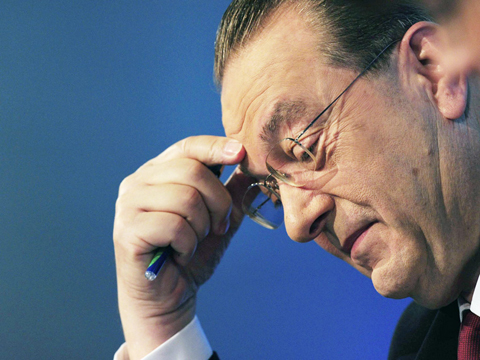Swiss bank UBS AG yesterday offered evidence of its recovery with a stronger-than-expected second-quarter profit of 2 billion Swiss francs (US$1.9 billion), and said it should resolve all tax matters with the US government by October.
The Zurich bank’s results compared with a SF1.4 billion loss in the second quarter of last year and far exceeded analysts’ forecasts.
UBS was boosted by a strong performance from its investment bank, whose pretax profit rose 10 percent to SF1.3 billion at a time crosstown rival Credit Suisse and US banking giants experienced a slowdown in the sector. Earnings were boosted by a SF595 million credit gain on financial liabilities.

PHOTO: EPA
“This was a good result in volatile market conditions and demonstrates the progress we are making,” UBS chief executive Oswald Gruebel said yesterday. “I remain confident in our future and I firmly believe that we have the right strategy in place.”
UBS said it also expected an end to its US regulatory problems now that the Swiss parliament has approved closer cooperation with the US Internal Revenue Service. The bank has agreed to turn over 4,450 names of wealthy Americans suspected of dodging taxes through secret accounts.
UBS and Credit Suisse were given a clean bill of health last week by the Swiss financial regulator, which released findings from its “stress tests” to coincide with the results of a much larger examination by the EU.
Credit Suisse Group also beat market expectations last week as it announced a second-quarter net income of SF1.6 billion.
In Germany, Deutsche Bank AG, Germany’s biggest lender, yesterday reported an unexpected 9 percent rise in second-quarter earnings as gains at its transaction banking and asset management operations helped counter a weaker investment banking performance.
The Frankfurt-based bank said net profit rose to nearly 1.2 billion euros (US$1.55 billion) from 1.1 billion euros a year earlier — beating analysts’ forecast of 1.05 billion euros. Pretax profit rose 16 percent to 1.5 billion euros.
The bank said overall revenue declined in the second quarter — a volatile quarter that included the peak of the eurozone debt crisis — to 7.2 billion euros from 7.9 billion euros a year earlier.
However, loan loss provisions declined sharply to 243 million euros from 1 billion euros in last year’s second quarter.
“In a quarter which was characterized by increased investor uncertainty and higher market volatility, Deutsche Bank’s investment banking business followed the industry-wide trend of weaker profitability,” CEO Josef Ackermann said in a statement.
However, he pointed to “very solid” performances from other divisions and said the bank’s private and business client segment had its best quarterly result since the peak of the financial crisis — demonstrating “the strength of our diversified business portfolio.”

WAITING GAME: The US has so far only offered a ‘best rate tariff,’ which officials assume is about 15 percent, the same as Japan, a person familiar with the matter said Taiwan and the US have completed “technical consultations” regarding tariffs and a finalized rate is expected to be released soon, Executive Yuan spokeswoman Michelle Lee (李慧芝) told a news conference yesterday, as a 90-day pause on US President Donald Trump’s “reciprocal” tariffs is set to expire today. The two countries have reached a “certain degree of consensus” on issues such as tariffs, nontariff trade barriers, trade facilitation, supply chain resilience and economic security, Lee said. They also discussed opportunities for cooperation, investment and procurement, she said. A joint statement is still being negotiated and would be released once the US government has made

NEW GEAR: On top of the new Tien Kung IV air defense missiles, the military is expected to place orders for a new combat vehicle next year for delivery in 2028 Mass production of Tien Kung IV (Sky Bow IV) missiles is expected to start next year, with plans to order 122 pods, the Ministry of National Defense’s (MND) latest list of regulated military material showed. The document said that the armed forces would obtain 46 pods of the air defense missiles next year and 76 pods the year after that. The Tien Kung IV is designed to intercept cruise missiles and ballistic missiles to an altitude of 70km, compared with the 60km maximum altitude achieved by the Missile Segment Enhancement variant of PAC-3 systems. A defense source said yesterday that the number of

Taiwanese exports to the US are to be subject to a 20 percent tariff starting on Thursday next week, according to an executive order signed by US President Donald Trump yesterday. The 20 percent levy was the same as the tariffs imposed on Vietnam, Sri Lanka and Bangladesh by Trump. It was higher than the tariffs imposed on Japan, South Korea and the EU (15 percent), as well as those on the Philippines (19 percent). A Taiwan official with knowledge of the matter said it is a "phased" tariff rate, and negotiations would continue. "Once negotiations conclude, Taiwan will obtain a better

FLOOD RECOVERY: “Post-Typhoon Danas reconstruction special act” is expected to be approved on Thursday, the premier said, adding the flood control in affected areas would be prioritized About 200cm of rainfall fell in parts of southern Taiwan from Monday last week to 9am yesterday, the Central Weather Administration (CWA) said. Kaohsiung’s Taoyuan District (桃源) saw total rainfall of 2,205mm, while Pingtung County’s Sandimen Township (三地門) had 2,060.5mm and Tainan’s Nanhua District (南化) 1,833mm, according to CWA data. Meanwhile, Alishan (阿里山) in Chiayi County saw 1,688mm of accumulated rain and Yunlin County’s Caoling (草嶺) had 1,025mm. The Pingtung County Government said that 831 local residents have been pre-emptively evacuated from mountainous areas. A total of 576 are staying with relatives in low-lying areas, while the other 255 are in shelters. CWA forecaster